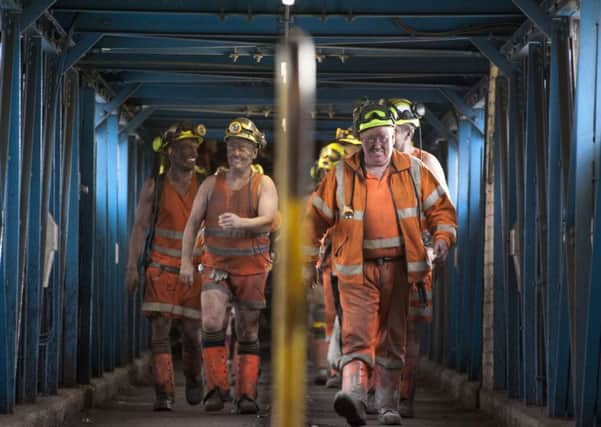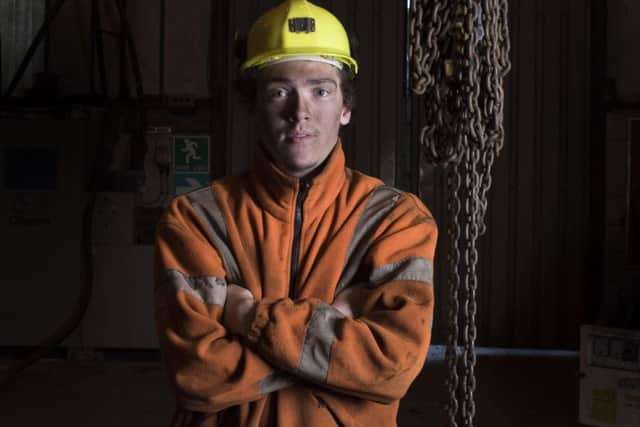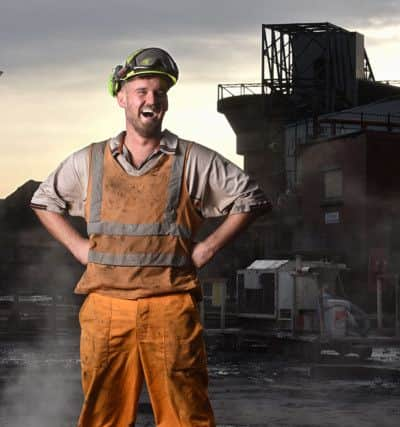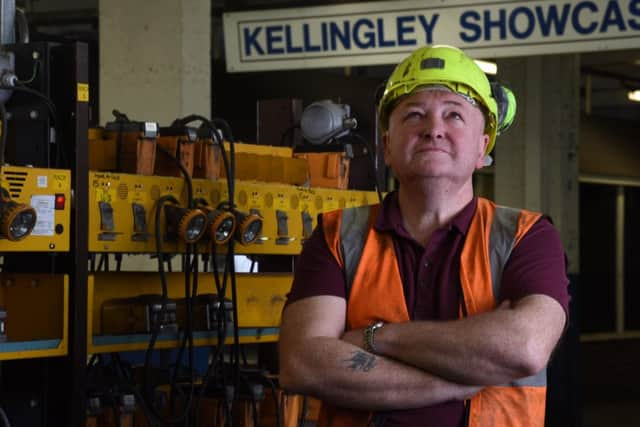A year after Britain's last deep mine closed, what happened to the men of Kellingley?


From a mile or so away the twin towers of what the locals call the Big K looks much as it always has. Close up though, the place is more like a ghost town. The winding wheel on Kellingley Colliery - Britain’s last deep mine - stopped turning on December 18 last year, it’s been months since anyone walked through the padlocked gates and now the only sign of life are the weeds pushing through the tarmac.
“I guess I always hoped that somehow it would survive,” says Kevin Rowe who worked at Kellingley for 10 years. Before that he’d spent 28 years at nearby Rossington and the black stuff was in his blood. “The truth was there had been a cloud over the industry since the strike of 1984-85 and for the last few years we always knew it was on a knife edge.
Advertisement
Hide AdAdvertisement
Hide Ad“That last day was horrendous. We’d worked together, we’d sweated together, so we cried together. The pit had given us a reason for being and suddenly we knew it was no longer going to be there.”


Kevin’s daily commute had involved taking a lift half a mile underground before boarding a train which took him a further four miles to the coalface. It was more than a job, it was a way of life and like many of the 450 miners who were left at Kellingley when the axe fell, Kevin admits he was fearful for the future.
“Financially I think we all knew that we would struggle to get a job which paid the same kind of wage, but you cut your cloth accordingly don’t you?,” he says. “The real problem was that pit was our own little world, it operated by different rules. It’s a bit of a cliche, but miners are a band of brothers. We had a way of talking to each other, a banter that you don’t get in any other workplace. Political correctness hadn’t reached the Kellingley coalface.”
Like a lot of the Kellingley miners, Kevin was in his 50s when the pit closed and instead of going to the Job Centre he decided to see if he could turn his interest in DIY into a business. Almost 12 months on he’s now a painter and decorator who also offers a handyman service and while the pay is not as good, the hours are more sociable than he ever enjoyed underground.
Advertisement
Hide AdAdvertisement
Hide Ad“Had I still been at the pit, I don’t think I would have been brave enough to have set up my own business,” he says. “Besides there would have been no need. I loved it there and I know I would have stayed until I dropped. This is a really different life and as much as I wished Kellingley hadn’t closed, I know the long hours meant I didn’t see my family has much as maybe I should have done.”


Kevin is one of a number of Kellingley miners whose fortunes post-pit are followed in a two part documentary which begins on the BBC on Monday. It shows them in the weeks before the closure as their trademark gallows humour comes to the fore as they attempt to get enough coal out of the pit to pay off its debts and secure their redundancy.
Most admit there was a surreal air around the place as the clock ticked down on a once great British industry, but while they all inevitably had one eye on the past there were also job applications to fill out and loved ones back home worried about the next gas bill and the next mortgage payment.
Until news of the closure came, Jack Robertson assumed that he would spend his working life in Yorkshire, but redundancy removed that security and earlier this year he became the first of his family to move out of the county.
Advertisement
Hide AdAdvertisement
Hide Ad“It was really hard,” says the 23 year old. “At the same time my mum found out she had stomach cancer. I didn’t want to leave, but there was no work left round where I lived. My girlfriend is from Sunderland and I reckoned there was a lot more industry up there so it made sense. I decided to give it a go. I didn’t have anything to lose.”


However, in Sunderland Jack found the steel industry was similarly on its knees and he knew that for every engineering job he applied for there were a dozen other experienced candidates.
“I don’t know whether I was kidding myself, but when I left Kellingley I thought I’d be alright. I thought, ‘Give it a month and I’ll have another job’. I’ve always enjoyed working and for a while it did feel like there was no hope. Things did come right in the end. I’m back working as an engineer and me and my girlfriend are expecting our first child. If Kellingley hadn’t closed, who knows whether I’d now be about to become a dad.”
During the last hours of Kellingley, the pit head was a sea of TV cameras and journalists. All recognised why they were there, although some of those at Big K couldn’t help but wonder whether things might have turned out differently had there been the same level on interest when the pit was fighting for its survival.
Advertisement
Hide AdAdvertisement
Hide AdFor Andy Gibson that last shift was particularly emotional. The 23 year old had joined Kellingley in 2010, but just a year later his dad, Gerry, who had worked in the industry for almost three decades, died when part of the roof collpased at the North Yorkshire pit.


“I don’t talk about it much, but I regret the fact that we never got to work together,” says Andy, who helped move the miners memorial at Kellingley to its new home at the National Coal Mining Musuem near Wkefield. “Whatever people think about the industry, Kellingley gave a lot of people a good life for a lot of years. I still miss it, but life has turned out ok. Just before the mine closed I got a job with the National Grid. One of ther ex-pit lads works there. He’s instilled the same sort of camaraderie in the team, but it’ll never be quite the same.”
While the men who went underground often had an uneasy relationship with Kellingley management when it came to the closure those in suits and ties felt equally emotional.
Today Shaun McLoughlin is head of engagement and collections at the National Coal Mining Musuem. Twelve months ago he was Kellingley’s mine manager and the man who oversaw that final shift. While he spent his last years in the industry around a boardroom table, having joined Kellingley as a craft apprentice in 1977 he knew what it was like to get his hands dirty.
Advertisement
Hide AdAdvertisement
Hide Ad“I really wanted to go into the military, but I was only 16 and my dad wouldn’t sign the papers,” he says. “I had to come up with a Plan B. Dad worked down the mine and he thought it wouldn’t suit me, but I loved it. It gave me a good life, it gave me a good education.
“Coal has always been traded in dollars and when the price fell through the floor from £70 to £30 a ton I knew there was no way back. It had happened before, but when coal was a much bigger industry it could ride the peaks and troughs. Without government subsidies there was no way it could stay open and the will just wasn’t there. I’m not sure the country is ready to take up the gap left by coal, but it’s done now and we all have to move on.”
The Last Miners, BBC1, November 21 and 28 at 9pm.